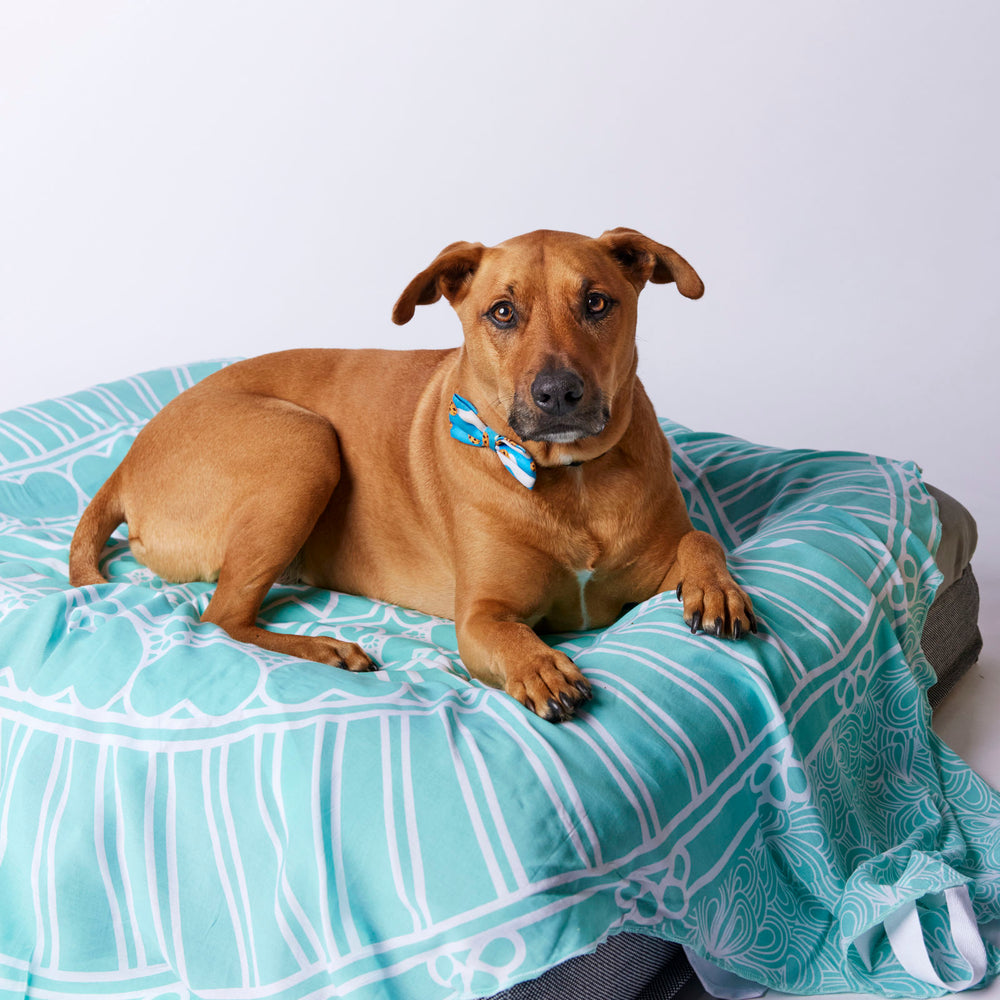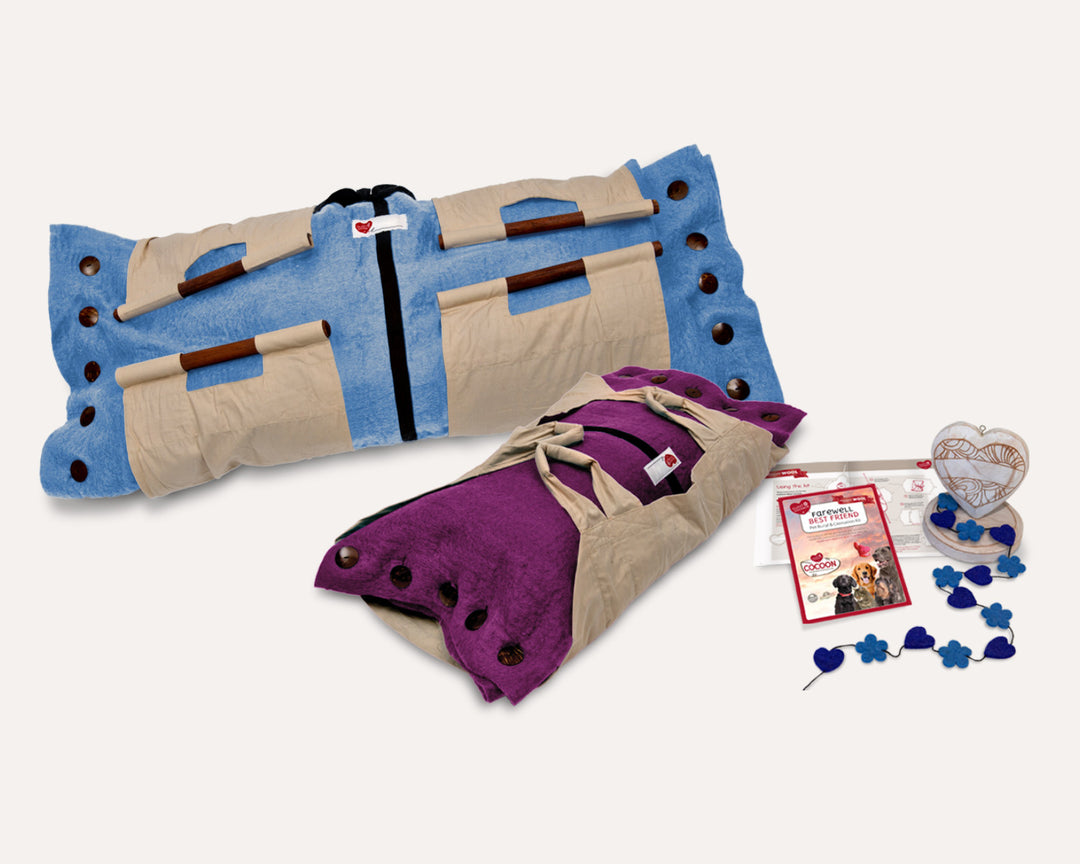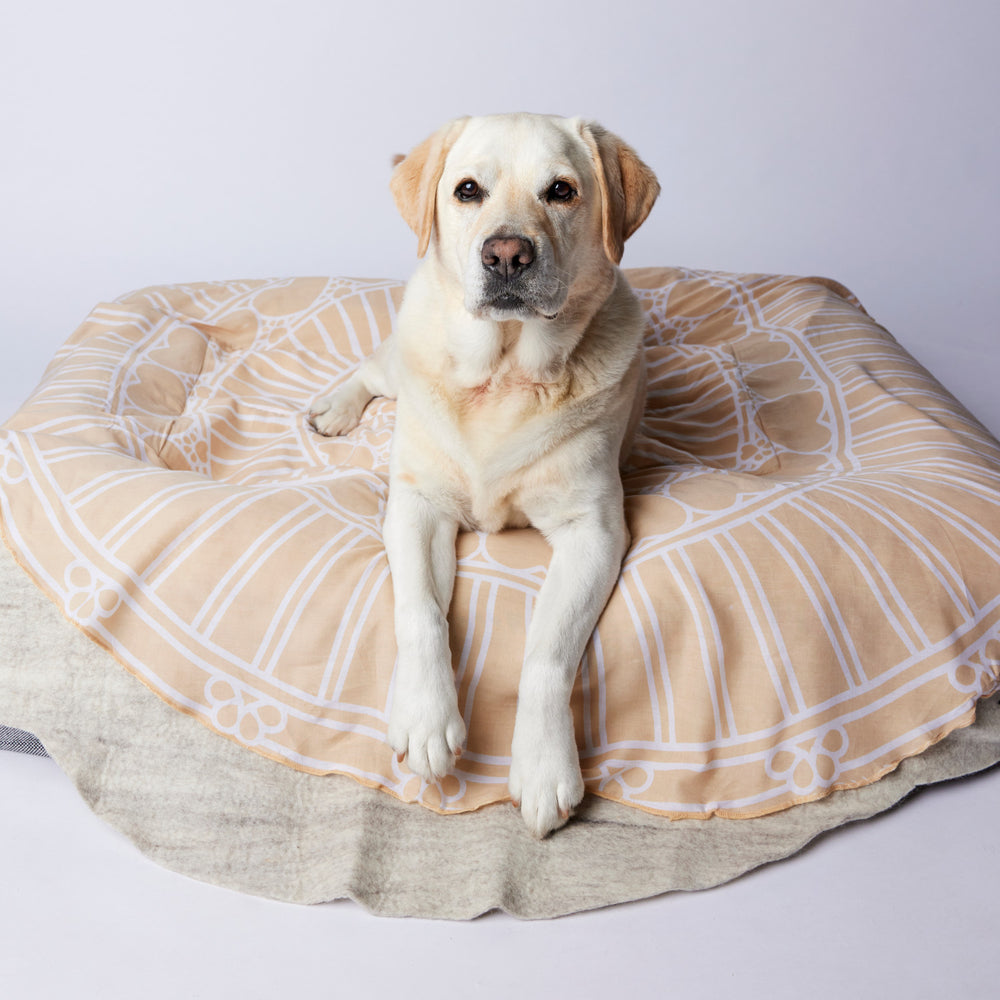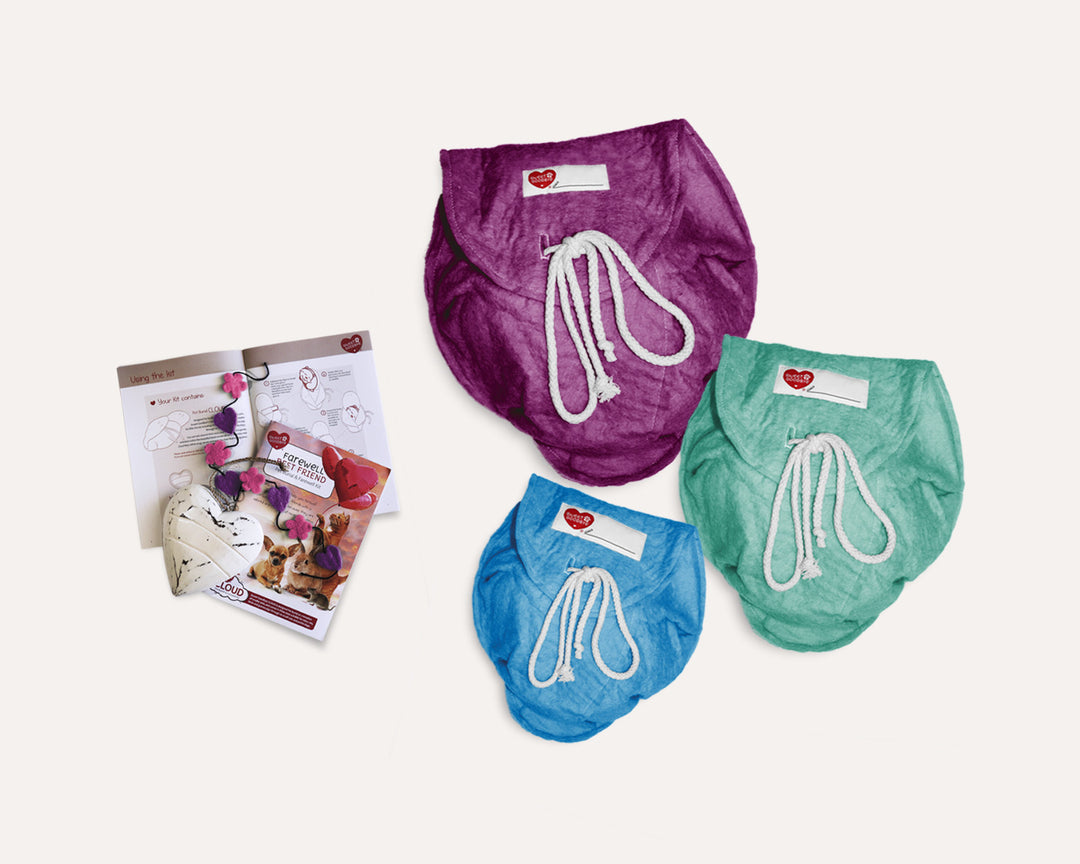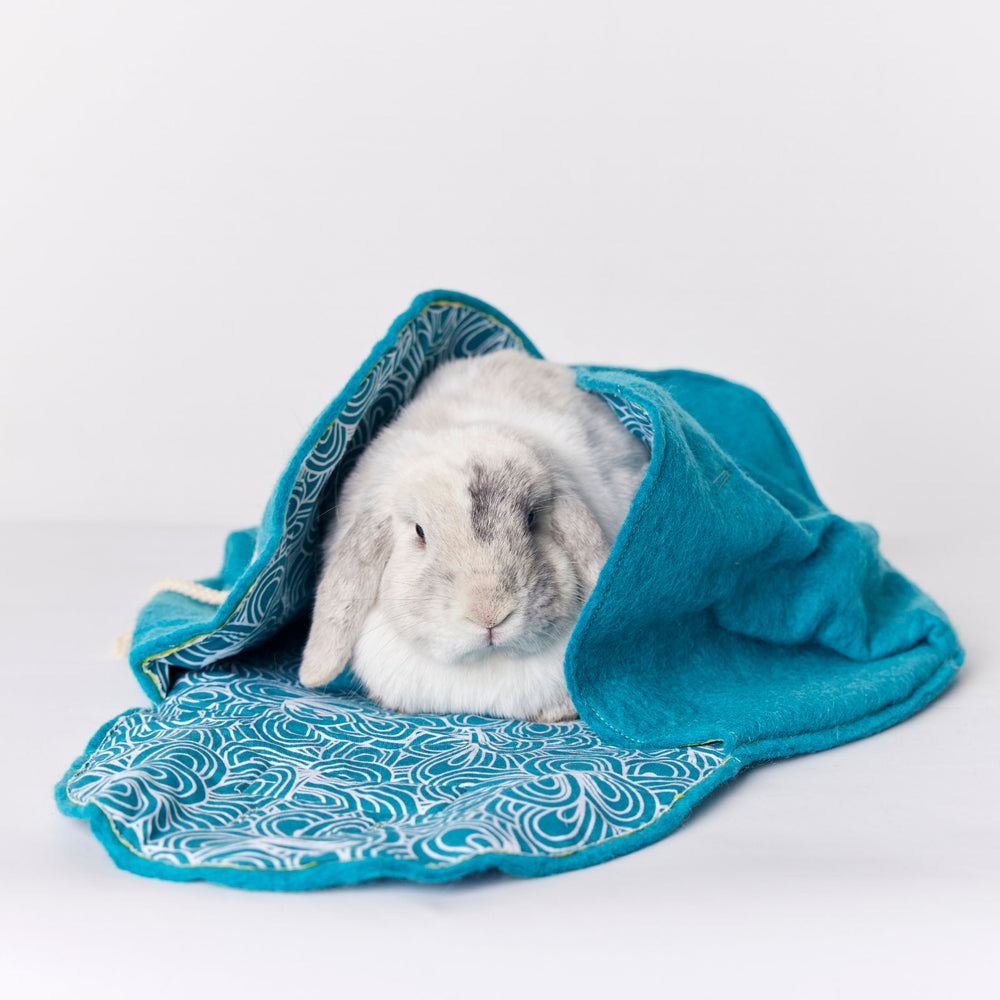Anxiety in Senior Dogs – Signs, Symptoms and What We Can Do About It

Anxiety can cause stress, not only for your senior dog, but for yourself as a pet parent as you navigate your way around how to best manage it.
We asked Registered Veterinary Nurse and Sweet Goodbye Customer Service Coordinator Chelsea Leonard to answer some of the more common questions about anxiety in senior dogs.
What are the common signs and symptoms of anxiety in senior dogs?
Anxiety can be displayed as aggression, urinating or defecating in the house, drooling, panting, destructive behaviour, depression, excessive barking, pacing, restlessness or repetitive or compulsive behaviours - just to name a few. If your senior pet shows any of these characteristics and they don’t normally, get them checked out by your vet for a diagnosis.
Are there specific triggers or situations that commonly cause anxiety in senior dogs?
Due to the deterioration of their senses, senior pets are more affected by sensory changes.
Loud noises, separation from owners, changes in routine, boredom and unfamiliar environments may trigger anxiety in our senior pets.
If your senior pet has an “out of character” reaction in any situation, it may be a symptom of anxiety.
How can I differentiate between normal age-related behaviour changes and anxiety in my senior dog?
It can be incredibly hard at times to differentiate between normal age-related behavioural changes and anxiety in a senior dog. One way to help distinguish the difference is taking a step back and looking at the situation in which your pet is behaving in that manner - has something changed, are they in an out of the ordinary environment, have they been placed in a situation that may affect their senses?
In some cases, our senior pets may experience situational anxiety which can turn into an age-related anxiety. Just like us, as our pets age they become more fearful of pain and turn very reactive in ongoing situations.
Are there certain breeds or individual differences that make some senior pets more prone to anxiety?
It is very hard to single out specific breeds when it comes to anxiety. All breeds can exhibit anxiety. Any dog that has been diagnosed with dementia or pain related illness will have a higher risk of exhibiting anxiety symptoms.
If I had to name some breeds, then some of the common breeds and their symptoms are:
Border Collie - easily bored, may display destructive behaviours.
German Shepherd - needs to be active, lack of physical activity may cause anxiety.
Cocker Spaniel - do not like being left alone and may develop hyper-attachment disorders.
What role does medical health play in contributing to anxiety in senior dogs, and how can it be addressed?
Medical health can be a large contributing factor. If you notice your senior dog showing anxiety-type symptoms it is well worth booking a health check with your local vet. They will provide perform an examination of your dog and look for possible health issues/illness that may be contributing to the anxiety. In some case’s the use of anti-depressants may be prescribed.
Are there any lifestyle changes or environmental modifications that can help alleviate anxiety in my senior dog?
Around the home, the best way to aid our senior dogs and alleviate their anxiety is structure and routine.
Structure and routine help reduce their confusion and aids them getting around comfortably and safely while still maintaining some independence.
As tempting as it is for us to move the furniture around or bring in new furniture to the home, we need to consider our oldies and if adding a new piece of furniture may affect them getting around the home independently.
Can diet and nutrition impact anxiety levels in senior dogs, and are there specific recommendations for calming foods or supplements?
Nutrition can have an impact on your pet’s anxiety levels as good and balanced nutrition aids a healthy nervous system and can assist your senior pet to be in a calmer state.
Some studies suggest Raw Feed diets have higher success in reducing anxiety levels and promote a better overall well-being. If you are thinking about switching your dog to a Raw fed diet it is best to consult your veterinarian first as there are many factors such as balance, essential vitamins and minerals and your dog’s current health status that must be considered before switching to such diet to ensure no adverse effects.
You can purchase over the counter supplements that may aid in reducing your dogs anxiety, these products work individually on dogs and the level of anxiety your dog exhibits will affect the effectiveness of the supplements. Should you find no difference using these type of supplements for a period of time it is best to consult with your veterinarian who may recommend stronger prescriptions medications/ supplements to aid your dog.
What types of activities or mental stimulation can be beneficial for reducing anxiety in senior dogs?
Just like a puppy our senior pets still need mental stimulation to keep their brain function at optimal capacity, reduce anxiety and reduce boredom.
Many “Boredom Busting” toys you can purchase are food motivating. These toys work by stimulating your dog’s 3 senses - sight, smell and sound. When placing treats in these toys it’s a great idea to use a food that isn’t their regular brekkie or dinner this will add to the excitement and engagement of the toy to aid in keeping them stimulated.
Are there specific training techniques or behaviour modification strategies that can be employed for an anxious senior dog?
Ways we can assist our senior pets:
- Build their confidence if they are hesitant to do something, but be prepared to accept that they may not be able to.
- Being patient with them expect that simple tasks and movements will take that bit longer now.
- Never yell or punish them as they don’t understand in the way we do.
- Utilise their 3 senses when getting their attention, noting that you may need to modify your approach as they age. For example: as they age their hearing will deteriorate so utilising their sense of touch and smell may be a better option in getting their attention.
How does age-related cognitive decline (doggie dementia) relate to anxiety in senior dogs, and what can be done to manage both conditions?
Dogs can experience dementia just like us. When your dog is affected by dementia you may notice them become more disorientated, they may become more dependent on you, may not be able to distinguish night and day. They may even start toileting in the house and forget to eat, and their activity levels may change - resulting in an increasing anxiety level.
There is no medication available to cure a dog of dementia however there are prescription diets and supplements that can aid in their cognitive health keeping them sharper for that bit longer.
Often dogs with dementia can live a happy life with great assistance from us however when life becomes difficult for them, or they are beginning to have health issues secondary to dementia, thought must be given into the best quality of life for them.
Are there medications or supplements available to help alleviate anxiety in senior dogs, and what are their potential side effects?
There are many supplements available to purchase over the counter from your vet or pet shop. Each supplement varies on its effectiveness for your dog as factors such as the level of anxiety they are experiencing can affect the effectiveness of the supplement. You may trial multiple products overtime before determining what is most effective for your dog.
The supplements on the commercial market from reputable suppliers are quite safe to use with little side effects but always consult your veterinarian before commencing any new supplement/s to ensure it is safe for your dog - some underlying medical conditions recommend against using certain supplements that have a specific active ingredients.
Medications are available to assist with managing anxiety where supplements and life style changes have not been successful, it is best to discuss this with your veterinarian to determine if your dog is a candidate for medication.
Never give your anxiety medication to your dog and never purchase prescription medication online or overseas and self-medicate your dog, this is extremely dangerous and harmful.
Can anxiety in senior dogs be linked to pain or discomfort, and how can I ensure my dog is not suffering silently?
Anxiety can absolutely be related to pain or discomfort. If you notice your dog exhibiting sudden changes such as becoming very reactive if you pat/touch them over specific areas of their body - this is a great indicator that they may be painful in this area. Book a health check with your vet and describe what you have experienced, your vet will perform a full exam of your dog and if they are able to distinguish an area of pain, they may provide a pain relief medication to help alleviate the discomfort. If tor dog has pain induced anxiety, you will likely notice a big difference in them once the pain relief has kicked in and their anxiety response drastically reduces or stopped all together.
Should I consider introducing a companion pet to help alleviate anxiety in my senior dog, and if so, what considerations should I keep in mind?
Introducing a new member to the household may aid in alleviating your dog’s anxiety - it will provide companionship to help keep them stimulated. Consider a trial period with the new pet to ensure the introduction of another pet works for your senior dog - it is possible another pet in the family may increase their anxiety levels!
In most circumstances I would recommend considering an adult dog instead of a puppy. This will reduce any injuries or over exhaustion of your senior dog that puppies can at times exacerbate.
How can I create a safe and comfortable space for my senior dog at home to minimise anxiety?
Our senior dogs begin losing their senses as they age and this must be considered when creating a safe and comfortable environment at home.
- Introducing non-slip mats for slippery floors to reduce slips and falls.
- “Baby Gates” to block access to steps and steep areas of the home.
- Keeping the layout of the home consistent, ensuring items are packed away to reduce your pet running/walking into items and injuring themselves.
Are some of the things you can do to assist your senior dog minimise anxiety levels.
Are there any warning signs that indicate I should seek immediate veterinary attention for my senior dog's anxiety?
The earlier anxiety is managed, the better success of the treatment working. Unfortunately with our busy lives, we are only picking up the more significant signs of anxiety in our senior dogs long after they have developed symptoms.
If you notice any of the below symptoms it is best to seek the assistance of your Veterinarian as soon as possible.
- Changes to the frequency of barking, whining, or suddenly howling excessively.
- Increase in panting, pacing, or trembling.
- Changes to toileting habits and Urinating and Defecating inside the home.
- Becoming more withdrawn, cowering, and hiding away.
- Excessive shedding that isn’t seasonal related.
- Excessive grooming.
- Becoming aggressive or irritable when its out of character.
All pets can get anxiety and they have very similar symptoms. The best advice I can offer is, if you see your senior dog or any senior pet display characteristics that are not normal for them, get it checked by your vet. If not anxiety, it may be something else that needs attention. Just like humans, early detection saves lives.





